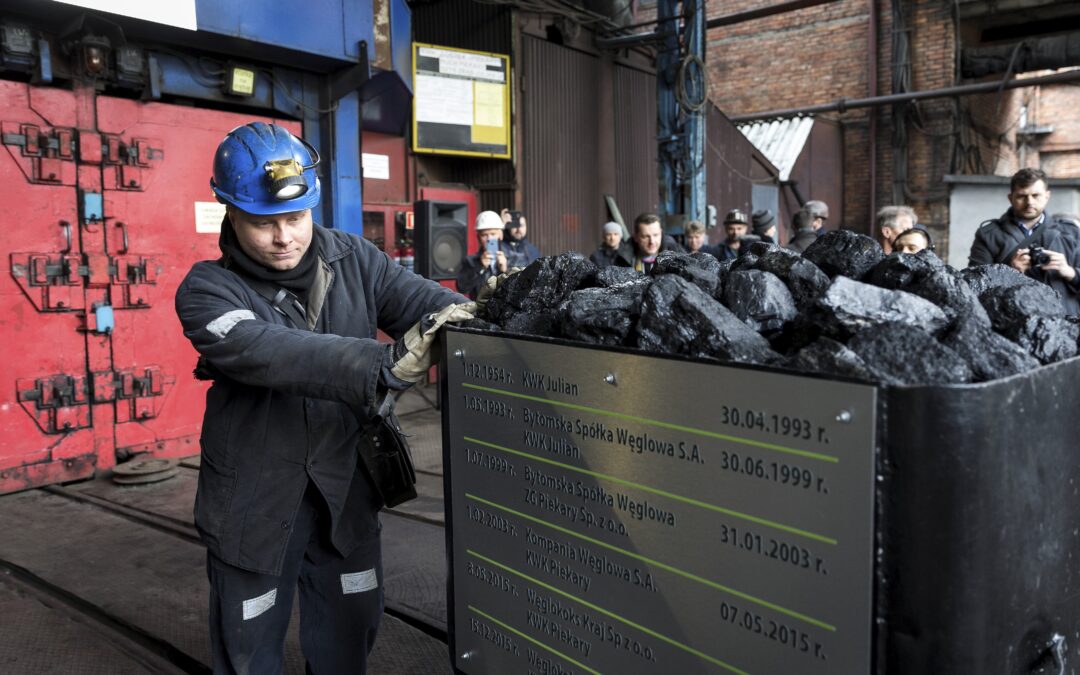By Katarzyna Kojzar
This article is a translation of the original, full-length version, republished by kind permission of OKO.press.
Despite the Polish government’s recent agreement to end coal mining by 2049, plans are being made to open new mines, which might not close until decades later. Although they seem to promise jobs and short-term benefits, the impact on local communities and nature could be catastrophic. Environmental groups and local authorities have, however, been fighting back, with courts holding up the new mines for now.
According to agreements signed between Poland’s government and its miners, the end of coal mining will not happen for another 29 years. The last existing mines, forecast to close in 2049, will be two in the Rybnik coal region, Chwałowice and Jankowice, belonging to Polska Grupa Górnicza (PGG). Yet mining companies are also applying to build new mines, in order to reach as yet untouched deposits before the cut-off date of 2049.
Imielin, Silesia: extraction methods “make the ceilings fall down”
One of these firms is PGG, Europe’s largest coal company, currently applying for permission to mine the Imielin-Północ deposits in Silesia.
“We were formally informed of these plans in October 2017. The mayor organised a meeting in the town’s cultural centre and announced that the Piast Ziemowit coal mine was planning to get into the Imielin-Północ deposits,” says Alicja Zdziechiewicz, who moved into the area not long before the announcement.
She says that Kompania Węglowa (now part of the PGG group) previously informed her that no mining damage would occur beneath her home. Yet plans appear to have changed.
“If the mine is opened, the town will suffer fourth- or even fifth-category damage,” Zdziechiewicz says. “The extraction is to be conducted using the cheapest, most aggressive methods – ‘so that the ceilings fall down’. This involves mining for coal and leaving holes below ground, which then collapse.”
This extraction would be conducted on three levels, one of which is a very shallow 180 metres below ground. Miners would be working beneath two drinking water reservoirs and many homes which, according to Zdziechiewicz, are not sufficiently secured against such damage. The gas supply would also be at risk – overall, the damage could affect almost half the town area.
Zdziechiewicz adds: “Two new halls, a library and new roads have been constructed in Imielin since 2000.”
“This is a pretty, leafy town, home to 9,000 residents in Silesia, and we would like to keep it this way. We do not wish to become another Bytom.”
Protests against these proposals began in 2018. With time, more people began attending the demonstrations and their demands gained the backing of retired miners and local authorities. Jan Chwiędacz, Imielin’s mayor, expressed concern in 2018, warning that the mine was “not taking any steps to counteract the existing effects” of its current mining projects.
Some 1,300 people have now signed an appeal to the Regional Directorate for Environmental Protection (RDEP) and PGG, opposing the new plans, but as yet to no avail. The mine’s representatives have given scant answers, “stressing only that they would minimise damage and were not breaking any laws,” according to Zdziechiewicz.
In October 2018, the RDEP issued a decision about environmental conditions relating to the coal deposits, which is the first step to the start of new mining processes. PGG has also applied to Poland’s environment minister issue a licence to start mining.
Yet things took a sudden turn in November of this year. At the start of the month, the General Directorate for Environmental Protection (GDEP), a national authority, blocked the investment, sending PGG’s efforts back to square one. However, local residents are not yet claiming victory. PGG has not yet officially withdrawn its plans for the Imielin-Północ mine.
We contacted the company to ask how they would be responding to the GDEP decision, and what profits were to be had from beginning mining operations there. The company refused to comment, saying that it was currently analysing the consequences of the decision.
Mining in Polesie could “radically alter the region”
Five hundred kilometres away on the other side of Poland, the spectre of coal extraction is also daunting environmental groups. In the Polesie National Park near Lublin, Global Mineral Prospects, the sister-firm of Australia’s Balamara company, is applying for the mining concession of the Sawin deposits – a 172 km-square area in a region that contains 288 million tonnes of coal, or 51 years’ worth of mining.
“This is only one of several mining projects which could radically alter this region,” said Krzysztof Gorczyca from the Nature and Humanity Association. “The first real danger is the Bogdanka mine, which is trying to secure a concession to excavate more deposits without any real trouble. The second danger is posed by the proposed construction of the Jan Karski Mine. And the third comes from the excavation of the Sawin deposit.”
“This will change the region, which at present is a biosphere reserve, into a mining region. This is a return to the communist era of Edward Gierek,” Gorczyca stressed.
Grzegorz Grzywaczewski from the University of Life Sciences in Lublin explained that exploration licences are the first step towards securing permission to mine specific deposits. He estimates that the mines could cause marshes to subside by as much as 2.5 metres, damaging their delicate structures irrevocably. According to Grzywaczewski, landscapes such as Poland’s second largest peat bogs, located in Polesie, “are becoming harder and harder to find, while damaged peat bogs can never be restored to their original condition”.
These deposits are found beneath three separate districts – Sawin, Cyców and Hańsk. Local authorities are in favour of the project going ahead, convinced mainly by the prospect of new jobs being created. “Bogdanka is already mining for coal here. Yes, there is damage caused by mining, there is land damage, but on the other hand the mine provides employment. We have never seen such opposition from residents before,” said Wiesław Pikuła, the Cyców district mayor.
Krzysztof Gorczyca emphasises that the mine is not just about extraction – there are railway connections to consider, along with truck traffic and slag heaps. “We try to explain this to local councillors: the mine will be there for a dozen or so years, leaving the region unable to support itself from farming or tourism.”
He adds that “the jobs which will supposedly be created by the mines will not be for local farmers. They will go to thousands of unemployed miners from Silesia – resettling them will be much more financially viable than training new workers.”
Gorczyca explains that the region is under the “Bogdanka spell”. The Puchaczów district, where Bogdanka is situated, has high income from taxes, nicely maintained pavements, as well as well-paid jobs for their resident miners. “This gets in the way of long-term thinking. Coal mining today works to the disadvantage of future generations. No one is yet wondering who will be needing all this coal in the foreseeable future,” Gorczyca added.
All the while, the mining project is being realised. According to the investor, it is preparing a wildlife inventory – something essential for the environmental decision to be secured, but the company did not wish to make any statements about the mine.
Paruszowiec, Silesia: “enormous” damage
Michał Mroszczak from the NIE initiative, which opposes mining of the Paruszowiec deposits, told us: “The notion of building a mine arrived here five years ago. (…) At first, I actually liked the proposal, because I had so little idea how much damage coal mining can cause.”
The Bapro Energy Complex group announced that it wants to invest 8 billion zloty and create up to 3,000 new jobs near Rybnik in southern Poland. The project included an energy block, giving a combined power output of 600 MW, the establishment of a hard coal mining plant and a coal processing plant.
“Although at first everything sounded encouraging, it has since transpired that the damage to be done to us will be enormous. The scale might not seem large – less than a thousand homes will be affected by mining damage. But we live there and do not wish to see our homes sink several metres down into the ground,” Mroszczak says.
Local entrepreneurs also oppose the mine, fearing that changes in the lay of the land could cause problems for their production lines.
According to Mroszczak, mining at Paruszowiec would last 30 years, and would only start after the necessary rights have been secured and the mine constructed. The Bapro group would therefore not have time to close the mine before 2049, he argues.
The regional directorate has issued an environmental decision agreeing to coal mining from the Paruszowiec deposits this year. The planned construction has also complicated local plans for managing the district which did not take the mine into account, with an ongoing case between the town of Rybnik and the Silesian voivode in court.
“The RDEP’s decisions are not final and cannot be used to apply for concessions to mine for coal,” says Miłosz Jakubowski, attorney-at-law from the Frank Bold foundation. The matter will be investigated by the national environmental protectorate – which can take a very long time. The Imielin case took two years to be resolved.
Now, everything depends on the court verdict. If this upholds the plans put forward by local people, the mine will not be permitted. Mroszczak says he is hopeful, in spite of everything. “The Imielin case is reason for us to be in good spirits,” he adds.
Coal mining companies are “profiting from chaos”
“Today’s efforts to secure the rights to mine coal are just a way of trying to curse and wish reality away,” says Paweł Czyżak, an economist from the Instrat Foundation. “The same was true of the ZE-PAK group, which in Greater Poland applied for the concession to open the Ościsłowo lignite opencast mine, and finally only withdrew their plans on 2 December.
“This is all the outcome of lack of political willpower and clear leadership where Polish energy production is concerned”, he added. “Coal mining companies think they can manage somehow by playing for time and profiting from the chaos surrounding plans to move away from coal.”
According to Wojciech Kukuła from the Prawnicy dla Ziemi (ClientEarth Warsaw) Foundation, new coal mines would be competing with old ones, which are no longer financially sustainable. Opening these would make matters worse for the mining industry.
“I consider plans to mine new deposits as not very realistic, especially in the context of the European Union’s ever more stringent environmental controls. (…) Competition from abroad is also huge, because it is often cheaper to import coal than to extract it here,” Wojciech Kukuła adds.
“I believe that political pressure is responsible for this dualistic vision of Poland’s energy-producing future. The first, more progressive vision, is presented in Brussels, and the second, less progressive – the one responsible for the plans to mine new coal deposits – is for Poland’s trade unions. But will these plans ever lead to actual investments? I would not expect this to happen.”
Translated by Marek Kazmierski
Main image credit: Grzegorz Celejewski / Agencja Gazeta





















